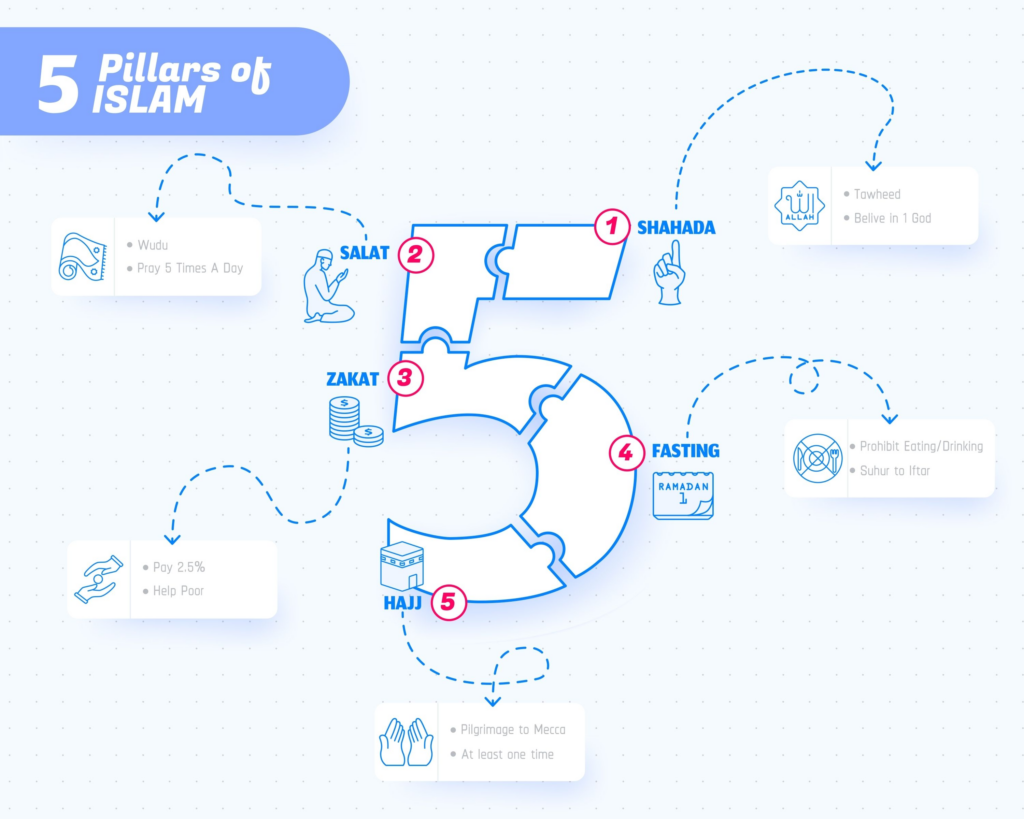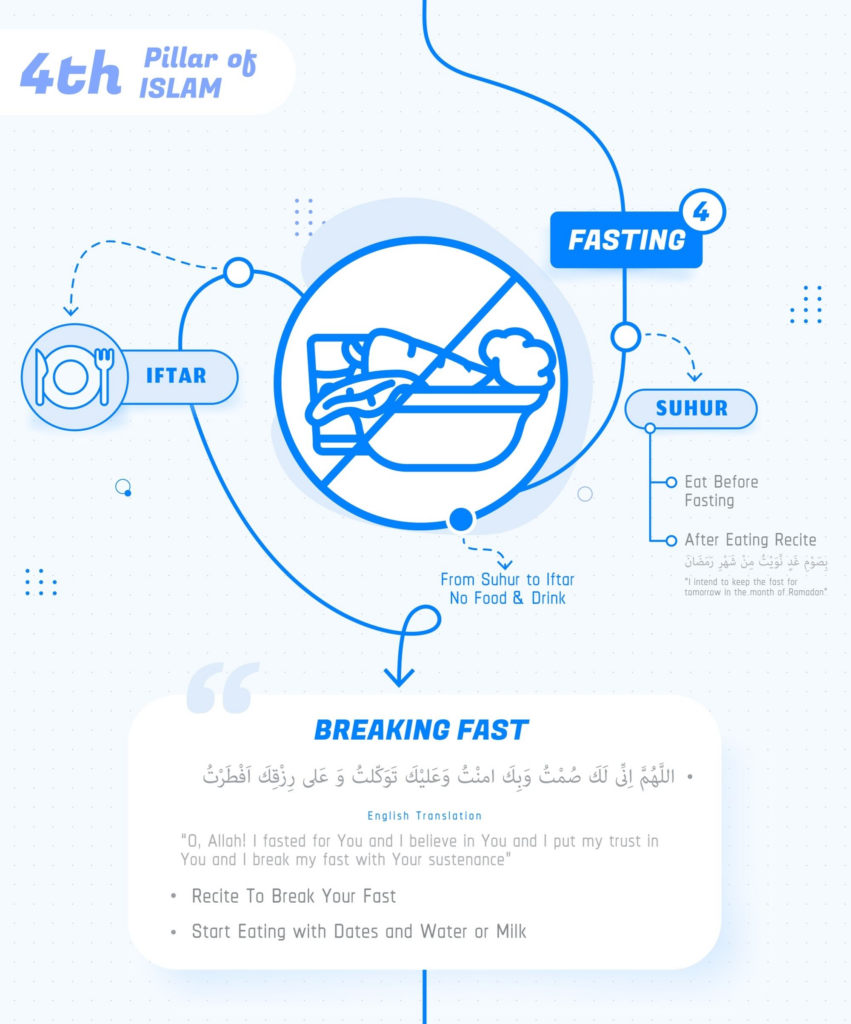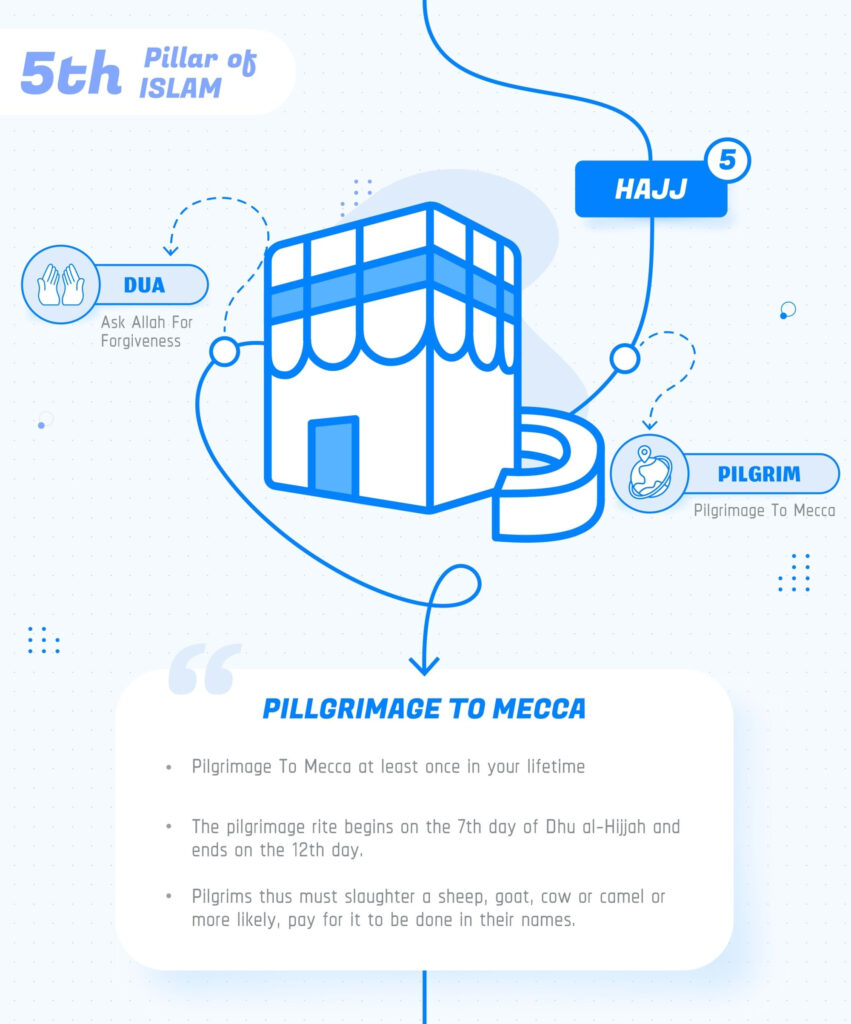The 5 Pillars
1st Pillar

Shahadah
“There is none worthy of worship except God and Muhammad is the messenger of God.”
This declaration of faith is called the Shahadah, a simple formula that all the faithful pronounce. The significance of this declaration is the belief that the only purpose of life is to serve and obey God, and this is achieved through the teachings and practices of the Last Prophet, Muhammad (SAW).
Honest recitation of the shahadah once, in Arabic, in front of two Muslim witnesses, is all that is required for a person to become a Muslim.
I bear witness that there is no deity but ALLAH, Who is without partner and I bear witness that Muhammad (SAW) is servant and Apostle.
ALLAH is pure and all praise is due to ALLAH and there is no deity but ALLAH, and ALLAH is most great and no one has the strength of virtue and power to remain unexpended from sin, but with ALLAH who is high and venerable.
There is no deity but ALLAH, who is without partner, He is the owner and all praises are for Him, He grants and spurns lives and lives itself, He is immortal. The whole welfare and benevolence is in His hand and he is the omnipotent.
O ALLAH! Thee my Lord, there is no deity except thee, thee created me and I am your servant and I am upon your oath and promise till I have strength. I betake myself to thee for those evils which I conducted. I confess for thee for the blessings that are upon me and I confess my sins So forgive me because there is no one who can excuse the sins.
2nd Pillar
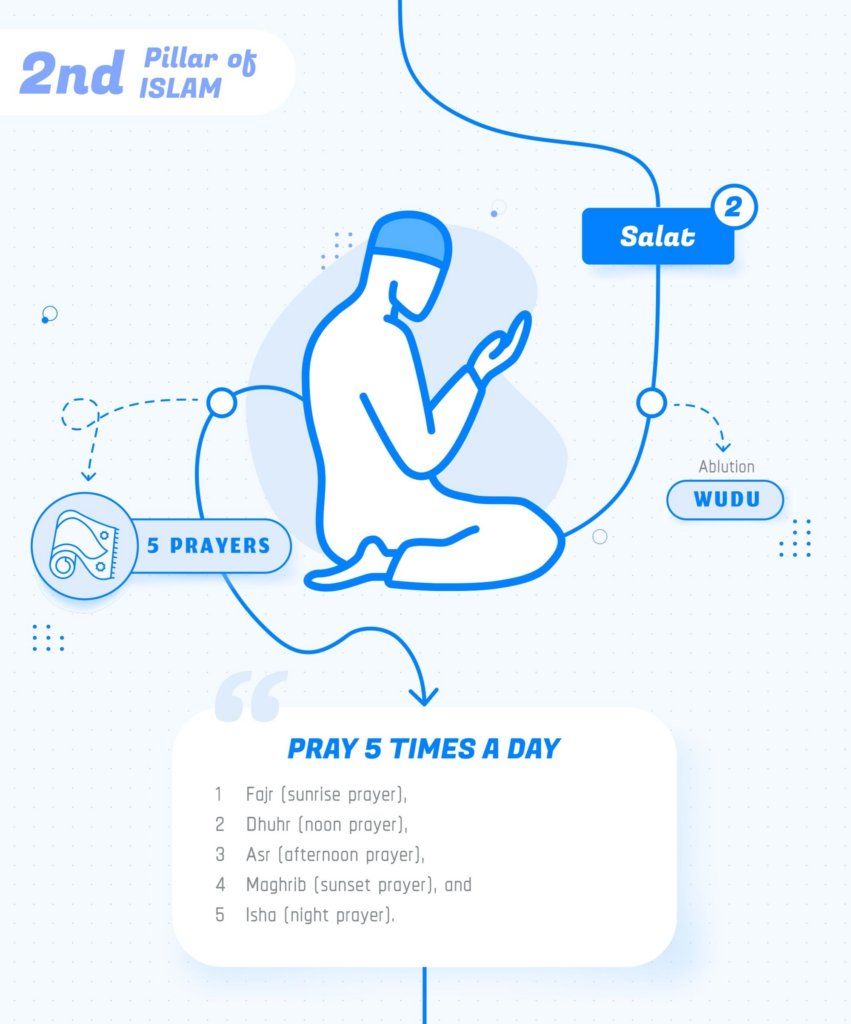
Salah
Before we start on the virtues of salaah, here is a simplified table showing how many rakaats should be offered:
| Namaaz | Sunnah(before) | Fard | Sunnah(after) | Nafl | Witr | Nafl |
| Fajr | 2 | 2 | – | – | – | – |
| Dhur | 4 | 4 | 2 | 2 | – | – |
| Asr | 4 | 4 | – | – | – | – |
| Maghrib | – | 3 | 2 | 2 | – | – |
| Isha | 4 | 4 | 2 | 2 | 3 | 2 |
Salat is one of the five pillars of Islam, it is a very important of the faith. The Holy Quran repeatedly commands the offering of salat and indeed declares it to be a fundamental character of a believer. The benefits of salat are countless.
Salat strengthens man’s spiritual faculties. It is the best way to form a relationship with one’s Creator. It purifies one’s spirit, and through it protects a Muslim from evil.
God created man to worship Him and salat is the most excellent kind of worship.
The Holy Quran says:
“Recite that which has been revealed to thee of the Book, and observe Prayer. Surely, Prayer restrains one from indecency and manifest evil, and remembrance of Allah indeed is the greatest virtue. And Allah knows what you do.” (29:46)
Abu Hurairah ( may Allah be pleased with him) relates that he heard the Holy Prophet ( peace and blessings be on him) say:
“Tell me, if one of you had a stream running at his door and he took a bath in it five times a day, would any dirt be left upon him? He was answered: No dirt would be left on him. The Holy Prophet (peace and blessings be on him) observed: This is the case of the five prayers. Allah wipes out all faults in because of them.” (Bukhari)
Jabir ( may Allah be pleased with him) relates that he heard the Holy Prophet ( peace and blessings of Allah be upon him) say:
“Giving up prayer is equal to disbelief and associating partners with Allah.” (Muslim)
Five Daily Prayers
Salat, the obligatory Muslim prayer, is said at appointed times fixed in relation to the sun’s position. The time of Fajr, the morning prayer begins at dawn and ends just before sunrise. The time of Zuhr, the midday prayer, begins after the sun has crossed the zenith point and has begun to decline. The Asr prayer is said when the sun has further advanced in decline, in the late afternoon. The time of the Maghrib prayer begins immediately after sunset. It lasts till dusk. The Isha prayer can be said after dusk has finally disappeared, giving way to the darkness of the night.
QASR PRAYER
The Shari’ah defines a traveller (Musafir) as a person who leaves his village or area with an intention of travelling for a distance of three days. (Note: On dry ground the measurement is taken as miles and the total amount of miles are fifty-seven and a half {57.5} [Fatawa-e-Razvia, Bahar-e-Shariat].)
Distance of Travel and the application of Qasr (shortening)
Rule: A clear route on dry ground for a distance of 57.5 miles is covered in a car or train in less than an hour but according to Shari’ah it is still regarded as a journey and the rules of Qasr and other journey rules will apply [Radd-ul-Mohtar].
Rule: Not only is an intention of travelling sufficient, but one has to leave the area. If it is a city then to leave the city; if it is a town, to leave the town and if it is a city then not only the city but its associated landmarks after which the journey has begun [Durr-e-Mukhtar, Radd-ul-Mohtar].
Rule: If the station is outside the area, then the journey will begin on reaching the station as long the intention to travel for a ‘journey’ has been made.
Rule: It is also necessary for a traveller to make the intention of a distance of more than three days (57.5 miles) from where he starts and if he makes the intention to travel for a distance of two day
3rd Pillar
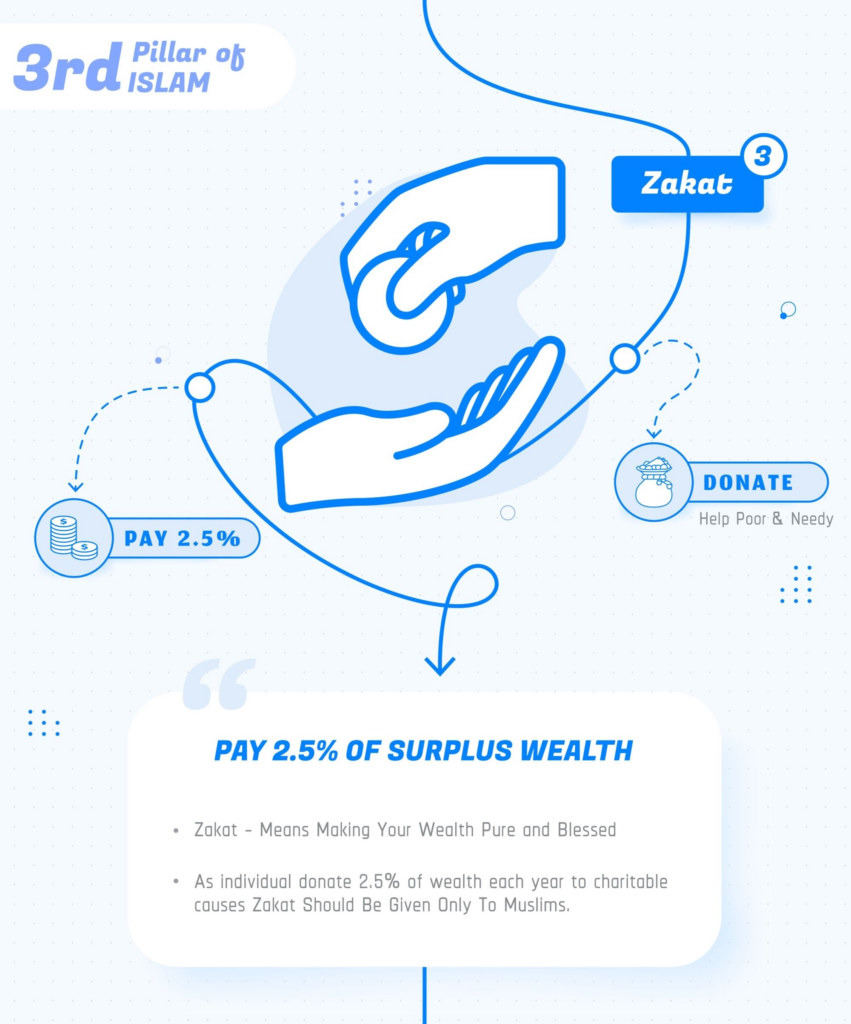
Zakah
Zakat (Almsgiving) is a part of devotion commanded by Allah. It is a means where the well-off pay a set amount of their wealth (2.5%). Zakat means to purify oneself. It is obligatory on Muslims to pay a little percentage of their accumulated wealth towards Zakat, which is used for the benefit of the needy and the poor. Zakat is not on one’s property that is in personal use but rather on the assets which have a means of increasing and which are surplus to one’s needs. It is a means of social justice and order. It teaches sympathy of the highest order.
4th Pillar
Saum (Fasting)
Along with salat, another important form of worship is fasting. It is obligatory for each Muslim, apart from some exemptions, to fast in the month of Ramadhan. During the hours of fasting, food and drink and conjugal relations between husband and wife are forbidden. It has been commanded that during fasting one should pay attention to the remembrance of God and study the Holy Quran in abundance. One should try to curtail one’s worldly pastimes as much as possible during Ramadhan, and to be particularly inclined towards charity and almsgiving.
Human life is dependent on food and drink and the continuation of the human race depends on the marital relationship. Whilst fasting, one refrains from them both, as if bearing witness to God that for His pleasure man gives up the factors (temporarily) upon which his very existence depends. The various other benefits of fasting are that man gets to exercise sacrificing physical comfort and to endure hunger and thirst. Fasting creates a sense of equality between the rich and the poor. By developing an appreciation of hunger and thirst, it makes the well-off think of the needs of the poor and impresses a feeling of compassion in their hearts. It makes them appreciate, through the practicality of it, the state a human being endures when hungry and thirsty. Ramadhan is a most effective and excellent means of spiritual development for mankind.
5th Pillar
Hajj
Hajj is the fifth Pillar of Islam and another form of worship. It is an annual pilgrimage to the holy sites in Mecca which each adult Muslim, who can afford it, has to perform once in a lifetime. Apart from the financial aspect, the ability to afford the pilgrimage also means that one is able to travel and perform the Hajj in peace. During Hajj, the person who intends to perform it is required to travel to Mecca during the prescribed days and observe all the rites and ceremonies.
During Hajj, Muslims from all corners of the world gather in Mecca and perform the rites of Hajj and thus strengthen the bond of Muslim unity. Muslims perform Hajj in order to visit the holy sites where their faith started. More importantly it is a pilgrimage to the Ka’aba, which we believe is the first place of worship ever built on this earth, Muslims thus refer to it as House of God.
The ceremony of Hajj is also symbolic of the Unity of God; all Muslims gather from the four corners of the earth in one spot at an appointed time and worship God. There are no difficulties to perform Hajj apart from the obvious financial commitment in order to travel to Mecca.
Summary of 5 Pillars
